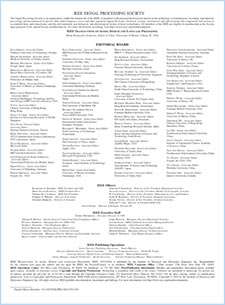- Our Story
- Publications & Resources
- Publications & Resources
- Publications
- IEEE Signal Processing Magazine
- IEEE Journal of Selected Topics in Signal Processing
- IEEE Signal Processing Letters
- IEEE Transactions on Computational Imaging
- IEEE Transactions on Image Processing
- IEEE Transactions on Information Forensics and Security
- IEEE Transactions on Multimedia
- IEEE Transactions on Signal and Information Processing over Networks
- IEEE Transactions on Signal Processing
- IEEE TCI
- IEEE TSIPN
- Data & Challenges
- Submit Manuscript
- Guidelines
- Information for Authors
- Special Issue Deadlines
- Overview Articles
- Top Accessed Articles
- SPS Newsletter
- SigPort
- SPS Resource Center
- Publications FAQ
- Blog
- News
- Dataset Papers
- Conferences & Events
- Community & Involvement
- Professional Development
- For Volunteers
- Information for Authors-OJSP
-
Home
Conferences Events IEEE Signal Processing Magazine IEEE SPL Article IEEE TIFS Article IEEE TMM Article IEEE TSP Article Jobs in Signal Processing Lectures Machine Learning Seasonal Schools Signal Processing News SPM Article SPS Distinguished Lectures SPS Newsletter Article SPS Webinar SPS Webinars SPS Webinar Series Webinar webinars
-
Our Story
What is Signal Processing?

The technology we use, and even rely on, in our everyday lives –computers, radios, video, cell phones – is enabled by signal processing. Learn More » -
Publications & Resources
-
SPS Resources
- Signal Processing Magazine The premier publication of the society.
- SPS Newsletter Monthly updates in Signal Processing
- SPS Resource Center Online library of tutorials, lectures, and presentations.
- SigPort Online repository for reports, papers, and more.
- SPS Feed The latest news, events, and more from the world of Signal Processing.
-
SPS Resources
-
Conferences & Events
-
Community & Involvement
-
Membership
- Join SPS The IEEE Signal Processing Magazine, Conference, Discounts, Awards, Collaborations, and more!
- Chapter Locator Find your local chapter and connect with fellow industry professionals, academics and students
- Women in Signal Processing Networking and engagement opportunities for women across signal processing disciplines
- Students Scholarships, conference discounts, travel grants, SP Cup, VIP Cup, 5-MICC
- Young Professionals Career development opportunities, networking
- Get Involved
-
Technical Committees
- Applied Signal Processing Systems
- Audio and Acoustic Signal Processing
- Bio Imaging and Signal Processing
- Computational Imaging
- Image Video and Multidimensional Signal Processing
- Information Forensics and Security
- Machine Learning for Signal Processing
- Multimedia Signal Processing
- Sensor Array and Multichannel
- Signal Processing for Communication and Networking
- Signal Processing Theory and Methods
- Speech and Language Processing
- Technical Working Groups
- More TC Resources
-
Membership
-
Professional Development
-
Professional Development
- Signal Processing Mentorship Academy (SigMA) Program
- Micro Mentoring Experience Program (MiME)
- Distinguished Lecturer Program
- Distinguished Lecturers
- Distinguished Lecturer Nominations
- Past Lecturers
- Distinguished Industry Speaker Program
- Distinguished Industry Speakers
- Distinguished Industry Speaker Nominations
- Industry Resources
- IEEE Training Materials
- Jobs in Signal Processing: IEEE Job Site
-
Career Resources
- SPS Education Program Educational content in signal processing and related fields.
- Distinguished Lecturer Program Chapters have access to educators and authors in the fields of Signal Processing
- Job Opportunities Signal Processing and Technical Committee specific job opportunities
- Job Submission Form Employers may submit opportunities in the area of Signal Processing.
-
Professional Development
-
For Volunteers
-
For Board & Committee Members
- Board Agenda/Minutes* Agendas, minutes and supporting documentation for Board and Committee Members
- SPS Directory* Directory of volunteers, society and division directory for Board and Committee Members.
- Membership Development Reports* Insight into the Society’s month-over-month and year-over-year growths and declines for Board and Committee Members
-
For Board & Committee Members
Popular Pages
Today's:
- Information for Authors
- Membership
- (ICME 2026) 2026 IEEE International Conference on Multimedia and Expo
- (ICASSP 2026) 2026 IEEE International Conference on Acoustics, Speech, and Signal Processing
- IEEE Transactions on Audio, Speech and Language Processing
- Signal Processing 101
- Conferences & Events
- Call for Papers for ICASSP 2026 Now Open!
- Information for Authors OJSP
- Conference Call for Papers
- Access Restricted
- Information for Authors-SPL
- SPS Webinar: An Anomaly Detection Framework with Compressed Transformer Architecture for Tiny ML
- (ASRU 2025) 2025 IEEE Automatic Speech Recognition and Understanding Workshop
- IEEE Transactions on Signal Processing
All time:
- Information for Authors
- Submit a Manuscript
- IEEE Transactions on Image Processing
- IEEE Transactions on Information Forensics and Security
- IEEE Transactions on Multimedia
- IEEE Transactions on Audio, Speech and Language Processing
- IEEE Signal Processing Letters
- IEEE Transactions on Signal Processing
- Conferences & Events
- IEEE Journal of Selected Topics in Signal Processing
- Information for Authors-SPL
- Conference Call for Papers
- Signal Processing 101
- IEEE Signal Processing Magazine
- Guidelines
Last viewed:
- SPS Webinar: Deep Generative Models for Bayesian Imaging
- Engineer and Artist - A Promising Collaboration
- Sadaoki Furui received the 63rd NHK Broadcast Cultural Award
- (EUSIPCO 2025) 2025 European Signal Processing Conference
- IEEE JSTSP Special Series on Artificial Intelligence for Smart Agriculture
- IEEE Journal of Selected Topics in Signal Processing
- New Benefits for SPS Student Branch Chapters
- Revitalizing Underwater Image Enhancement in the Deep Learning Era
- Editorial Board
- IEEE TMM Special Issue on Trustworthiness in Social Multimedia Analytics and Delivery
- On Bayesian Fisher Information Maximization for Distributed Vector Estimation
- Editorial Board
- Meet the 2025 Candidates: IEEE President-Elect
- Information for Authors
- (ICME 2025) 2025 IEEE International Conference on Multimedia and Expo
Modified Magnitude-Phase Spectrum Information for Spoofing Detection
You are here
Publications & Resources
For Authors
Top Reasons to Join SPS Today!
1. IEEE Signal Processing Magazine
2. Signal Processing Digital Library*
3. Inside Signal Processing Newsletter
4. SPS Resource Center
5. Career advancement & recognition
6. Discounts on conferences and publications
7. Professional networking
8. Communities for students, young professionals, and women
9. Volunteer opportunities
10. Coming soon! PDH/CEU credits
Click here to learn more.
Modified Magnitude-Phase Spectrum Information for Spoofing Detection
Most of the existing feature representations for spoofing countermeasures consider information either from the magnitude or phase spectrum. We hypothesize that both magnitude and phase spectra can be beneficial for spoofing detection (SD) when collectively used to capture the signal artifacts. In this work, we propose a novel feature referred to as modified magnitude-phase spectrum (MMPS) to capture both magnitude and phase information from the speech signal. The constant-Q transform is used to obtain the magnitude and phase information in terms of MMPS, which can be denoted as CQT-MMPS. We then use this information for the proposal of a handcrafted feature, namely, constant-Q modified octave coefficients (CQMOC). To evaluate the proposed CQT-MMPS and CQMOC features, three classic anti-spoofing models are adopted, including the Gaussian mixture model (GMM), the light CNN (LCNN) and the ResNet. Additionally, since there is usually no prior knowledge about the spoofing kind in real-world applications, two novel methods referred to as three-class classifiers with maximum spoofing-score (TCMS) and multi-task learning (MTL) are designed for unknown-kind SD (UKSD). The experimental results on ASVspoof 2019 corpus show that CQMOC outperforms most of the commonly-used handcrafted features, and the CQT-based MMPS performs better than the magnitude-phase spectrum and the commonly-used log power spectrum. Further, the MMPS-based systems can achieve comparable or even better performance when compared with the state-of-the-art systems. We find that the newly-designed TCMS and MTL methods outperform the combination-based method for UKSD and meanwhile, generalize much better than the respective-kind-based methods in cross-spoofing-kind evaluation scenarios.
SPS Social Media
- IEEE SPS Facebook Page https://www.facebook.com/ieeeSPS
- IEEE SPS X Page https://x.com/IEEEsps
- IEEE SPS Instagram Page https://www.instagram.com/ieeesps/?hl=en
- IEEE SPS LinkedIn Page https://www.linkedin.com/company/ieeesps/
- IEEE SPS YouTube Channel https://www.youtube.com/ieeeSPS
Home | Sitemap | Contact | Accessibility | Nondiscrimination Policy | IEEE Ethics Reporting | IEEE Privacy Policy | Terms | Feedback
© Copyright 2025 IEEE - All rights reserved. Use of this website signifies your agreement to the IEEE Terms and Conditions.
A public charity, IEEE is the world's largest technical professional organization dedicated to advancing technology for the benefit of humanity.











